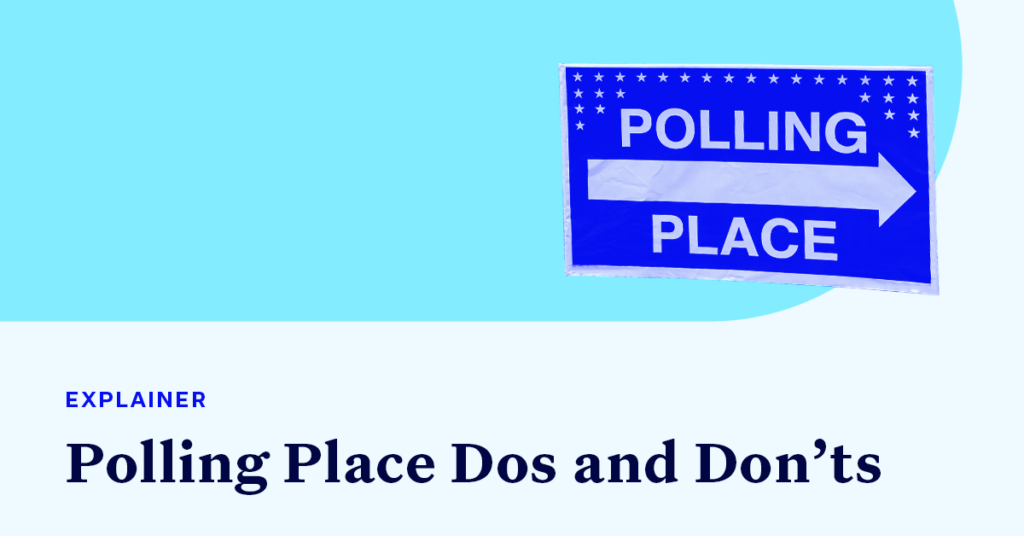In-Person Voting, Explained

Soon, millions of voters will head to the polls to cast their ballots. Whether you’re voting for the first time or have been voting for decades, it’s important to know what is and isn’t allowed at your polling place.
If you’re planning to vote in person, here are some important dos and don’ts to be aware of.
1. DON’T take pictures of your ballot.
Before you snap a picture in the voting booth, check your state’s laws on ballot pictures. Several states ban cameras inside polling places to protect voters’ privacy, and in some states it is illegal to post a picture of your filled-out ballot.
2. DO take a selfie with your “I Voted” sticker.
While you may not be able to take a picture of your ballot, you can still share a picture of your “I Voted” sticker! Did you know that different states have different stickers? There is even a contest run by the U.S. Election Assistance Commission that awards the most creative and original “I Voted” stickers every year. After you vote and leave the polling place, take a picture with your sticker and share it with the hashtag #EveryVoteCounts.
3. DON’T get out of line.
You have a right to stay in line to cast your ballot. If you are still waiting in line to vote when the polls close, stay in line to make sure you cast your ballot. If you are worried about long lines on Election Day, vote early!
4. DO stay safe.
Voting safely during the pandemic requires adding another step to your voting plan. Make sure to bring a mask and hand sanitizer. Do your best to stay six feet away from others in line.
5. DON’T leave your ballot incomplete.
Vote your full ballot from top to bottom. While every vote is an opportunity to have your voice heard, this is especially true for local races. Before you go to the polls, look up your sample ballot and research all the candidates and state propositions. Some states won’t let you use your phone while voting, but you’re allowed to bring handwritten notes.
6. DO ask questions.
If you have any question about your ballot — either before you get to the polls or while you’re voting — ask! You can call the Democratic National Committee’s Voter Assistance Hotline at 1-833-DEM-VOTE or text QUESTION to 43367. You can also ask poll workers for assistance — they are trained to help answer your voting questions!
7. DON’T be a bystander.
If you think someone is trying to prevent you or someone else at your polling location from voting, call the Election Protection Hotline or DNC Voter Assistance Hotline immediately. No concern is too small.
8. DO your homework.
Before you head out to the polls, check your state’s voting rules and make sure you have everything you need to ensure your vote counts. Check your registration and know your exact polling location. If you end up at the wrong polling location, a poll worker will give you a provisional ballot, which will only be counted if election officials decide after the polls close that you’re an eligible voter. Make sure you know exactly where you are registered to vote so you can cast a regular ballot.
9. DON’T campaign at the polls.
Every state has some form of restriction on “political activities” near polling places. Some examples of political activity restrictions include prohibitions on handing out campaign literature (like fliers), displaying campaign signs within a certain distance of the polling place or verbally advocating for a specific candidate at the polls. In some states, simply wearing political merch to the polls — such as a button, t-shirt or hat with your candidate or political party displayed — is considered campaigning. To be safe, leave your political swag at home or under your coat while you cast your ballot.
10. DO volunteer.
Did you vote early this year? There’s still more to do! You can still volunteer to be a poll worker on Election Day. There will likely be opportunities to volunteer after Election Day to help ensure every eligible vote is counted. Sign up now to volunteer or reach out to a campaign in your area to see where they need your help. If you’re a lawyer looking looking to help progressive campaigns, you can also sign up to volunteer with We The Action.
For more information on voting in person, read our Explainer on the rights you have at the polls. Share this dos and don’ts list with your family and friends to make sure every voice in your community is heard in November.